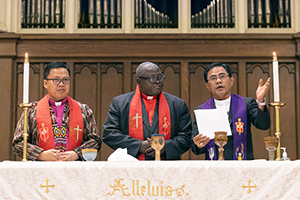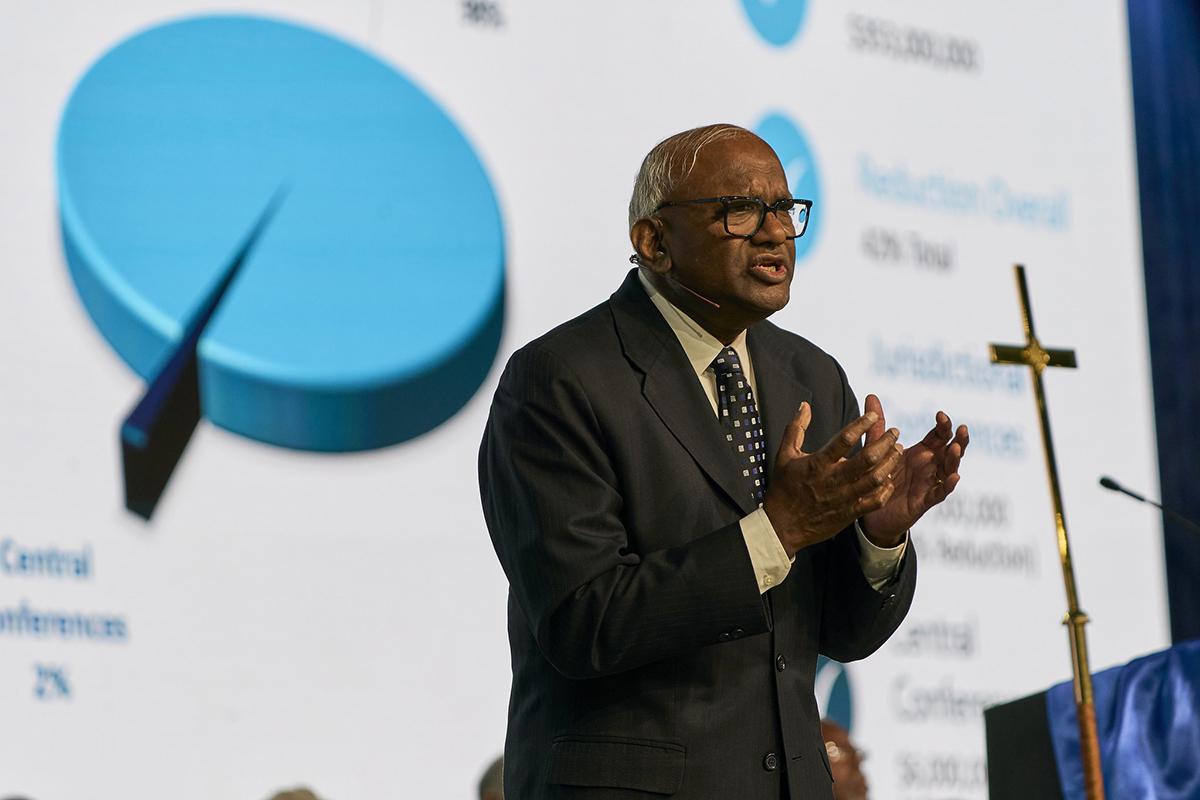Key Points:
- Before heading into their legislative work, delegates received a sober picture of United Methodist finances.
- The budget presentation included the need to reduce the number of bishops in the U.S. and add less bishops to Africa than initially planned.
- Still, delegates also heard hope for the denomination to pivot from church exits to revitalization.
United Methodist leaders challenged General Conference delegates to chart a brighter future for the denomination — but to do so with significantly less funds and fewer bishops.
At the first gathering of the policymaking body since a quarter of the denomination’s U.S. churches left, the delegates heard sobering news about the financial state of The United Methodist Church.
Before the delegates is a proposed denomination-wide budget that would be its lowest in 40 years. It also represents the biggest budget drop in the denomination’s history.
“This is a General Conference that must send clear signals to the local church,” said incoming Council of Bishops President Tracy Malone, “that we are keenly aware that the loss of membership and the decline of sustainability has a direct influence on the amount of funds available to support ministry.”
United Methodists can’t support ministry at the general-church level in the same way they have in the past, the East Ohio Conference bishop said.
Before heading to the legislative committees where they would begin their main work, delegates heard two successive presentations aimed at providing a framework for their decision-making.
The first presentation featured Malone and other leaders of the Council of Bishops and Connectional Table, a coordinating body for denomination-wide ministries. That presentation urged delegates to map a pathway to the next expression of The United Methodist Church.
The second presentation by the Rev. Moses Kumar, the top executive of the General Council on Finance and Administration, offered a detailed look at the budget available to fund that next expression.
The proposed 2025-2028 denominational budget coming before delegates is $353.1 million. That represents a 42% reduction from the budget delegates approved at the 2016 General Conference, the assembly’s last regular session.
Under that budget proposal, about $347 million would come from the U.S. and $6.1 million from the central conferences — church regions in Africa, Europe and the Philippines.
The general church budget is apportioned to annual conferences, regional bodies consisting of multiple congregations, which in turn rely on apportionments — shares of church giving from congregations.

General Conference photos
U.S. conferences distribute their apportionments among seven general-church funds. Each fund supports a different category of ministry: bishops, ministerial education, general administration, the Black College Fund, Africa University, ecumenical work and the World Service Fund, which supports the work of most general agencies.
Central conferences pay apportionments but only to the Episcopal and General Administration funds.
“How can we turn this challenge of a reduced budget into an opportunity?” Kumar said. “I believe God is telling us it is time to do things differently.”
He especially emphasized that the budget includes cutting the number of bishops in the U.S. and adding only two bishops in Africa, rather than the initially planned five.
“We know that God is calling us to reimagine our Episcopal Fund, which receives between a 13% to 15% reduction under the proposed budget,” Kumar said. “GCFA remains concerned about the long-term sustainability of the Episcopal Fund.”
The budget approved in 2016 funded a total of 66 bishops — 46 in the U.S., 13 in Africa, four in Europe and three in the Philippines. The proposed budget would reduce that total to 54 — reducing the number of U.S. bishops to 32 and increasing the number of African bishops to 15.
Under this budget proposal, the U.S. would hold no bishop elections this year.
“I want to emphasize, GCFA has no authority to control the number of bishops elected,” Kumar said. “It is our role to communicate what we can and cannot afford.”
He warned that if the Episcopal Fund goes into the red, the finance agency’s only option is to reduce salaries, housing and office support. The agency does not have the authority to move money between the denomination’s seven general church funds. Only General Conference can do that.
Kumar also urged central conferences to step up their giving. At present, he said apportionment collection rates in the U.S. are at 86% compared to 59% in central conferences.
“Giving would need to increase from central conferences to pay for the bishops in their regions,” he said.
Subscribe to our
e-newsletter
The number of bishops and the budget itself is not a done deal.
During General Conference, the interjurisdictional study committee meets to make recommendations on the number of bishops in each U.S. jurisdiction. At present, the Book of Discipline — the denomination’s church law book — says each U.S. jurisdiction is entitled to five bishops. But General Conference could change that.
General Conference ultimately approves the budget and the allocations for each of the seven general church funds.
But even the bottom line that General Conference approves is likely to change as the next four years progress.
In the U.S., the formula for determining an annual conference’s apportionments is its total local church net expenditures multiplied by a General Conference-approved base rate.
Net expenditures are what a church spends after capital expenses, apportionments and benevolent giving. Put another way, the fewer local churches there are, the lower the net-expenditure side of the ledger. Fluctuations in net expenditures ultimately will change the budget’s bottom line.
But if the number of churches grows, net expenditures potentially also could rise.
Ultimately, United Methodist leaders see hope for the denomination’s next chapter.
“All of the challenges that have converged upon us have simultaneously placed us in a position where a pivot, a restart, is desperately needed,” said outgoing Council of Bishops President Thomas J. Bickerton, who also leads the New York Conference. “We are hearing the desire for a compelling and relevant vision that will energize and motivate United Methodists worldwide.”
North Katanga Area Bishop Mande Muyombo, the chair of the Connectional Table, acknowledged that the work of restarting the church won’t be completed during the two weeks General Conference meets in Charlotte.
“However, we do believe that this work can be set in motion,” he said. “In large measure it will not be done with debate and legislation as much as it will be accomplished with deeper discernment and conversation with lay and clergy from across our worldwide connection.”
Hahn is assistant news editor for UM News. Contact her at (615) 742-5470 or newsdesk@umnews.org. To read more United Methodist news, subscribe to the free daily or weekly Digests.




